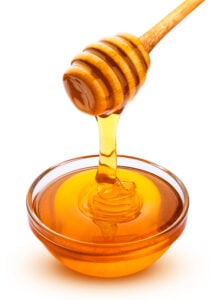Honey might appear as a natural sweetener, but overdoing it comes with risks. While it offers some benefits, eating too much can lead to weight gain, blood sugar spikes, and tooth decay. Some people experience digestive discomfort or allergies, and infants under one shouldn’t have it at all due to botulism risks.
Weight Gain and Increased Caloric Intake
Though honey is often seen as a natural sweetener, consuming too much can lead to unwanted weight gain. A single tablespoon contains about 64 calories, and overdoing it adds up quickly. Excess calories from honey contribute to fatty acid formation, where the body stores unused energy as fat. This process strains the liver, which works harder to metabolize the extra sugars.
For those prioritizing health while serving others, moderation is key. Honey’s sweetness can improve meals, but relying on it heavily might disrupt balanced eating habits. Studies show that just 10% of daily calories from added sugars—including honey—can increase health risks.
Swapping honey for whole fruits or reducing portion sizes helps maintain energy without overloading the body. Small changes, like diluting honey in tea, make a difference. By staying mindful of intake, one can enjoy honey’s benefits while avoiding unnecessary weight gain and liver strain.
Blood Sugar Spikes and Diabetes Risk
Because honey is packed with natural sugars, it can cause rapid spikes in blood sugar when consumed in large amounts. For those managing diabetes or insulin resistance, this poses a significant risk, as frequent spikes might lead to long-term metabolic disruption. Studies show that just one tablespoon of honey contains about 17 grams of carbs, which can quickly elevate glucose levels. Over time, this could contribute to inflammation concerns, worsening insulin sensitivity.
| Risk Factor | Impact |
|---|---|
| Blood sugar spikes | Short-term energy crashes |
| Insulin resistance | Long-term diabetes risk |
| Inflammation | Worsened metabolic health |
Moderation is key, especially for those already at risk. Though honey offers some benefits, excessive intake can undermine health goals. Balancing it with fiber-rich foods may help stabilize blood sugar, but caution remains crucial for vulnerable groups.
Tooth Decay and Dental Problems
Honey’s sticky sweetness isn’t just a treat for taste buds—it’s also a feast for cavity-causing bacteria. Though natural, honey contains sugars that cling to teeth, fueling bacteria that produce acids. Over time, this can lead to enamel damage and other oral hygiene concerns. Research shows that honey has a similar effect on teeth as table sugar, increasing the risk of cavities by 20% when consumed frequently without proper care.
- Enamel erosion: The acids from bacteria erode tooth enamel, making teeth more sensitive and prone to decay.
- Plaque buildup: Honey’s thick consistency sticks to crevices, promoting plaque formation and gum irritation.
- Delayed cleaning: Waiting too long to brush after eating honey gives bacteria more time to harm teeth.
For those prioritizing health, moderation and immediate rinsing can help protect smiles while still enjoying honey’s benefits.
Digestive Issues and Stomach Discomfort
Consuming excessive honey can lead to an upset stomach due to its high fructose content. Some people encounter diarrhea or bloating as their bodies struggle to process large amounts.
These digestive issues can render even small meals uncomfortable for sensitive individuals.
Upset Stomach
Excessive honey intake can sometimes lead to digestive discomfort, including bloating, cramps, or mild nausea. The high fructose content in honey might overwhelm the digestive system, causing abdominal cramping, nausea, and vomiting in sensitive individuals.
While honey is often praised for its natural benefits, overconsumption can disrupt gut balance, especially for those with fructose intolerance or irritable bowel syndrome.
- Fructose malabsorption: Some people struggle to digest large amounts of fructose, leading to gas and stomach pain.
- Acid reflux trigger: Honey’s acidity could aggravate heartburn or indigestion in prone individuals.
- Overstimulated digestion: The rapid sugar absorption can induce temporary nausea or cramping.
Moderation helps avoid these issues, ensuring honey remains a helpful, soothing food rather than a source of discomfort. Those with sensitive stomachs should monitor portions carefully.
Diarrhea Risk
Large amounts of honey can also contribute to loose stools or diarrhea, particularly in those with sensitive digestion. The high fructose content in honey can overwhelm the intestines, leading to faster digestion and watery stools. About 30% of people struggle to absorb fructose properly, which may worsen symptoms.
Frequent diarrhea raises the dehydration risk, as the body loses fluids rapidly. It can also cause an electrolyte imbalance, weakening muscles and causing fatigue. For those serving others, like caregivers, recognizing these signs early helps prevent discomfort. Offering small portions of honey or pairing it with other foods can facilitate digestion.
Staying hydrated and replenishing lost nutrients with balanced meals supports recovery. Monitoring intake guarantees honey remains a sweet treat without unwanted side effects.
Bloating Concerns
Honey’s natural sweetness can sometimes come with an uncomfortable side effect: bloating. Consuming too much honey can lead to intestinal discomfort and abdominal distention, especially for those with sensitive digestion. The high fructose content can ferment in the gut, causing gas and a feeling of fullness.
- Fructose Absorption Issues: Some people struggle to digest fructose efficiently, leading to bloating.
- Overconsumption: Even natural sugars, like honey, can overwhelm the digestive system in large amounts.
- Sensitivity Factors: Individuals with IBS or similar conditions may experience heightened reactions.
About 30% of adults report occasional bloating after sugary foods, and honey’s concentrated sweetness can contribute. Moderation helps, but those prone to digestive issues should monitor their intake carefully. Switching to smaller portions or pairing honey with fiber-rich foods may ease discomfort.
Allergic Reactions and Sensitivities
Can honey, often praised for its natural sweetness, trigger allergic reactions in some people? While rare, some individuals might experience sensitivities to honey, particularly if they have pollen allergies. Symptoms can range from mild skin irritation, like itching or hives, to more severe autoimmune responses, such as swelling or difficulty breathing. About 0.001% of people could react to honey due to pollen traces. Those with known allergies to bees or pollen should be cautious, as honey contains small amounts of these allergens.
For caregivers, it’s crucial to monitor reactions when introducing honey, especially to those with sensitive immune systems. Mild reactions can frequently be managed with antihistamines, but severe responses require immediate medical attention. Honey’s natural properties don’t make it risk-free, and understanding individual tolerances helps guarantee safe enjoyment. Always consult a healthcare provider if allergies are a concern.
Risk of Infant Botulism in Babies
Honey can contain botulism spores that are harmless to adults but dangerous for babies under one year old. Their immature digestive systems can’t fight off these spores, which could lead to infant botulism, a rare but serious condition.
Parents should avoid giving honey to infants to prevent this risk.
Botulism Spore Danger
- No Honey Before Age 1: A baby’s gut can’t neutralize the spores, making even small amounts dangerous.
- Hidden Sources: Check labels for honey in processed foods, cereals, or pacifier dips.
- Safe Alternatives: Use mashed fruits or approved sweeteners instead.
Caregivers should avoid honey entirely for infants to prevent botulium spore poisoning.
Digestive System Vulnerability
Infant botulism takes place as a baby’s digestive system isn’t yet strong enough to endure harmful bacteria. Honey can contain Clostridium botulinum spores, which might/could/can lead to gut microbiome disruption in infants under one year old. Their immature digestive tracts lack the acidity and beneficial bacteria needed to neutralize these spores, increasing the risk of digestive inflammation and toxin release.
Symptoms include weakness, constipation, and difficulty feeding, requiring immediate medical attention. Around 100 cases are reported annually in the U.S., with honey being a common source. Caregivers should avoid giving honey to babies, as their delicate systems need time to develop proper defenses. Instead, safer alternatives like breast milk or formula support healthy growth without unnecessary risks. Prevention remains the best way to protect vulnerable little ones.
Potential for Contaminants and Adulteration
While honey is often praised for its natural sweetness, it isn’t always as pure as people assume. Contaminants and adulteration can compromise its quality, posing risks for those who consume it regularly.
Pesticide contamination: Bees could collect nectar from plants treated with harmful chemicals, transferring traces into honey. Studies show that 30% of tested honey samples contained detectable pesticide residues.
Heavy metal adulteration: Some honey is sourced from regions where soil or water contains lead or cadmium, which can accumulate in the body over time.
Artificial additives: Unscrupulous producers sometimes dilute honey with syrups or sugars, stripping it of its natural benefits.
For caregivers and health-conscious individuals, choosing raw, organic honey from trusted sources reduces these risks. Testing for purity helps ensure safer consumption, especially for vulnerable groups like children or those with compromised immune systems. Awareness aids in protecting loved ones from unintended harm.
Increased Risk of Heart Disease
Excessive honey consumption could silently contribute to heart disease risks, a concern often overlooked due to its natural reputation. While honey is frequently viewed as a healthier sweetener, its high fructose content could lead to cholesterol concerns when consumed in large amounts. Studies suggest that over 50 grams of fructose daily can raise bad cholesterol (LDL) and triglycerides, augmenting heart disease risk.
Additionally, the rapid sugar spikes from honey might trigger heart rhythm irregularities in sensitive individuals, especially those with existing conditions.
For those prioritizing heart health, moderation is vital. Replacing some honey with whole fruits or fiber-rich foods can help balance sugar intake. Small changes, like reducing honey in tea or oatmeal, make a difference without sacrificing sweetness. Awareness of portion sizes guarantees honey remains a safe, occasional indulgence rather than a hidden peril.
Nutrient Imbalance and Lack of Dietary Variety
Relying too much on honey as a sweetener can quietly throw off the balance of essential nutrients in a person’s diet. While honey contains trace vitamins and antioxidants, it lacks the protein, fiber, and healthy fats found in whole foods. Overconsumption may lead to nutritional deficiencies, as it displaces more nutrient-dense options. Studies show that 70% of added sugar intake comes from processed foods and sweeteners like honey, which can skew dietary balance.
- Limited Micronutrients: Honey’s small amounts of vitamins don’t replace the broader spectrum found in fruits, vegetables, or whole grains.
- Gut Health Impact: Excess honey may cause microbiome disruption, feeding harmful bacteria while starving beneficial ones.
- Reduced Dietary Variety: Prioritizing honey-heavy meals can shrink the diversity of nutrients needed for long-term health.
For those serving others, balancing honey with whole foods can maintain nourishing meals without compromising wellness. Moderation helps preserve both nutrient intake and gut harmony.





